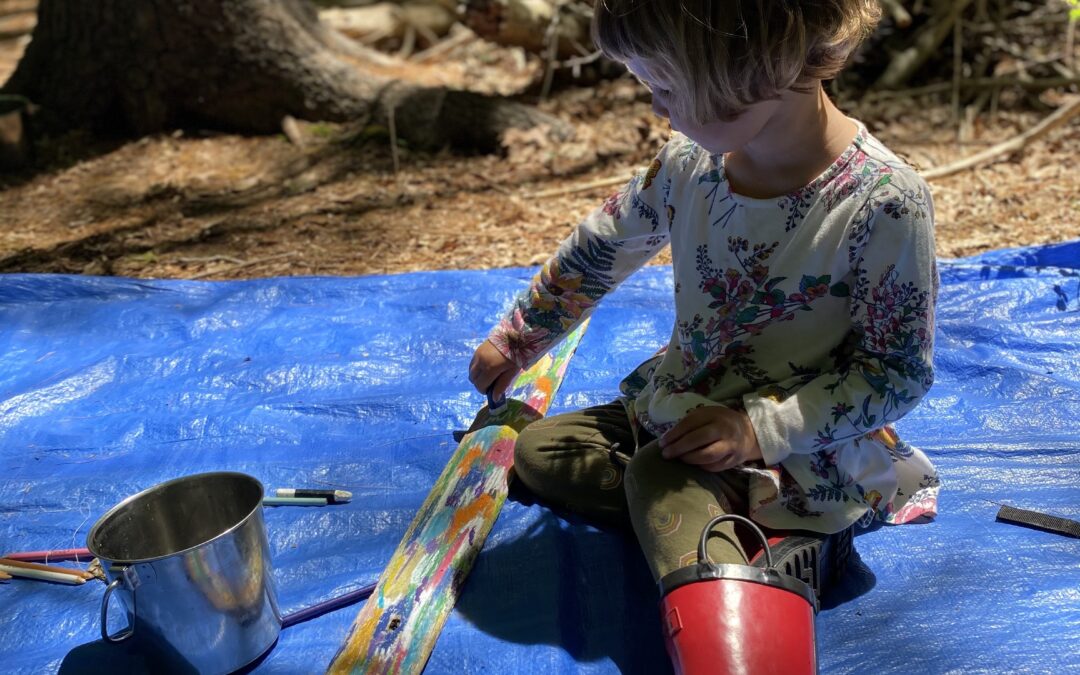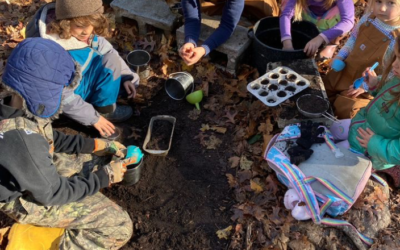Children Are Not Things to be Molded, But Are People to Be Unfolded

“Children are not things to be molded, but are people to be unfolded.” – Jess Lair
We are approaching our final week of classes for this season at Aishling Forest School; the sun is shining and temperatures are rising, the flowers are blooming and the pollinators are buzzing. As summer nears and we begin to witness Mother Nature blossom, we too witness our learners further blossom into their fullness. They have grown and learned so much over the past 14 weeks, and as a mother and mentor, I see clearly how Forest School nourishes a learner’s wholeness and supports their individual fulfillment as blossoming humans.
When I tell friends, family, and even strangers, that I send my daughter to Forest School, I am met with equal amounts of curiosity and skepticism.
“Forest School?”
“What does your daughter learn at Forest School?”
“Why don’t you just send her to regular school instead?”
For me, choosing Forest School was an intuitive decision. Mostly, I felt in my body and in my heart that it was the right thing to do for her and this is my why:
- First, I wanted her to be outside in nature rather than in a classroom.
- I wanted her to receive an ecological education, so that she would grow with a deep connection to the Earth.
- I understand that play is an essential form of learning based on pediatric brain research and that child-led play would grow her confidence and self-esteem.
- Plus, when given the time, space and a nurturing environment, she would discover her interests.
- I knew that growing with nature-connection as a priority would offer her invaluable teachings and experiences in responsibility, interconnection and empathy.
- And ultimately, I wanted my daughter to receive an education in which her wholeness as a unique and sovereign human being would be seen and honored, nourished and prioritized. Intuitively, I understood that the Forest School model of education, where children are regularly told they are “born perfect, whole and complete”, would support my daughter’s holistic development. As it does each of our learners here in the woods.
Holistic childhood development acknowledges that each and every child is a whole person, and nurtures SPICES (social, physical, intellectual, communication, emotional and spiritual wellness) – engaging the mind, body and spirit. The importance of holistic development is acknowledged by recent efforts to normalize “whole-child education” in public education systems. Key traits and skills cultivated through holistic development and whole-child education are what is referred to as “noncognitive skills” and include critical thinking, creativity, problem solving, persistence, and self-control.
Recent program evaluations by the National Institute for Early Education Research found that students educated using “whole child curricula”, or curriculum that emphasizes holistic development, make gains that surpass those of children who do not receive whole-child curricula, in language, literacy, and mathematics, and also in working memory and shifting attention between tasks. Furthermore, it is said that whole child development empowers children as creative and engaged citizens who can strengthen the wellbeing of a whole society. In this way, Forest School contributes to the betterment of the global future!
Here are just a few examples of the areas of holistic development we proudly facilitate and witness growth happening in, for our learners at Forest School:
Physical: Physical development encompasses awareness of surroundings and senses, gross motor skills, and fine motor skills. We watch physical development unfold at Forest School from our learner’s running into our “home in the woods” after greeting our Grandmother Tree, to climbing trees and muddy hills, and tying knots and whittling sticks. We witness our learners literally reach new heights, as they move past their comfort zones and dare to climb even higher with confidence. Every footstep along the woodland trail provides sensory feedback that strengthens the body and the mind!
 Intellectual: Intellectual development encompasses cognition, perception, receptive speech and expressive speech. Our learners grow intellectually everytime we present them with a new skill to try – from building fires from scratch (nonetheless with just one single match), playing games like “Blindfolded Caterpillar”, constructing with natural materials, or recognizing the Four Directions and sharings their own words of thanks and gratitude. We treat our learners with trust and respect as we allow them to explore their curiosity and arrive at their own conclusions, for example, “what do you think we need to gather to build this fire?” and encourage them to reflect on their decisions.
Intellectual: Intellectual development encompasses cognition, perception, receptive speech and expressive speech. Our learners grow intellectually everytime we present them with a new skill to try – from building fires from scratch (nonetheless with just one single match), playing games like “Blindfolded Caterpillar”, constructing with natural materials, or recognizing the Four Directions and sharings their own words of thanks and gratitude. We treat our learners with trust and respect as we allow them to explore their curiosity and arrive at their own conclusions, for example, “what do you think we need to gather to build this fire?” and encourage them to reflect on their decisions.
Emotional & Social: Emotional and social development encompasses how children feel about themselves and others, and encourages children to understand how and why they and others feel a particular way, and how to interact with others through feelings. Our intention at our opening community circle is for every learner to be seen and heard, and therefore honored. Every opening community circle we pose a question for learners to reflect upon their feelings, and every closing community circle we pose a reflective activity or question to encourage mindfulness and self awareness around how our session went. We play games and perform theatrics to understand how our actions might affect others.
Moral & Spiritual: Moral and spiritual development encompasses the honoring of values and ethics, and the nourishing of responsibility and empathy and a sense of interconnection. Our Community Manifesto/Agreements help us to navigate conflicts, as we ask our learners to agree upon how we want ourselves to be treated, how we will treat each other, and how we will treat Mother Earth. An understanding of our interconnection with each other and Mother Earth is inherent. We agree to celebrate ourselves and each other and the Earth through our actions and speech.
Here are some ways to continue holistic development in your home:
Move together: Family hikes in nature, or yoga in the living room, or anyway you like to move – let your child do it with you. You can let stories and songs and even games inspire the movement and engage your child.
Breathe together: Share in self-regulation and self-soothing techniques, like stopping to take deep breaths and “let go” of stress. Name your emotions and worries, and invite your child to do the same… and then, affirm the more positive emotions and experiences you would like to invite into your life. A great book with unique breathing activities is Breathe Like a Bear.
Learn together: Let your child watch you learn, so that they are motivated to learn on their own. For example, you can sit next to each other and read, and then share with each other what you are reading and learning about.
Celebrate together: Whether you speak words of gratitude to begin your day, or you like to sit down and pray. Invite moments of ritual and ceremony into your daily life to align with a higher purpose and meaning.
Storytelling + Storyacting: A Powerful Tool For Children
“Storytelling is the most powerful way to put ideas into the world today.”- Robert McAfee Brown So some may wonder, why is storytelling so crucial to children’s development and how can we encourage the practice with them? “Storytelling connects your child to...
What is Friluftsliv and Can It Make Us Healthier, Happier and More Creative?
"Friluftsliv isn't something you can touch. It's something you feel in your soul."– August Casson Friluftsliv (pronounced FREE-loofts-liv) or “open-air life” is a big part of Aishling Forest School’s outdoor pedagogy and is a centuries-old Nordic tradition of...
How Forest School Nurtures Brain Development
“When we help a child to feel secure, feel appreciated, feel that “somebody is deeply, truly interested in me,” by the way we just look, the way we just listen, we influence that child’s whole personality, the way that child sees life.” – Magda Gerber It is...




